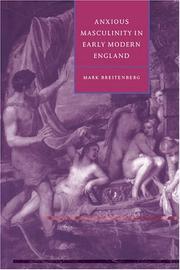| Listing 1 - 3 of 3 |
Sort by
|
Multi
ISBN: 9781316618103 9781107167735 1107167736 1316618102 9781316711835 1316731480 1316733416 1316711838 Year: 2017 Publisher: Cambridge Cambridge University Press
Abstract | Keywords | Export | Availability | Bookmark
 Loading...
Loading...Choose an application
- Reference Manager
- EndNote
- RefWorks (Direct export to RefWorks)
This book fundamentally revises our notion of why soldiers of the eighteenth century enlisted, served and fought. In contrast to traditional views of the brutal conditions supposedly prevailing in old-regime armies, Ilya Berkovich reveals that soldiers did not regard military discipline as illegitimate or unnecessarily cruel, nor did they perceive themselves as submissive military automatons. Instead he shows how these men embraced a unique corporate identity based on military professionalism, forceful masculinity and hostility toward civilians. These values fostered the notion of individual and collective soldierly honour which helped to create the bonding effect which contributed toward greater combat cohesion. Utilising research on military psychology and combat theory, and employing the letters, diaries and memoirs of around 250 private soldiers and non-commissioned officers from over a dozen different European armies, Motivation in War transforms our understanding of life of the common soldier in early modern Europe.
Polemology --- History of Europe --- anno 1700-1799 --- Alltag. --- Erfahrung. --- Identität. --- Militarismus. --- Military morale --- Military morale. --- Männlichkeit. --- Sociology, Military --- Sociology, Military. --- Soldat. --- Soldiers --- Soldiers. --- History --- Europa. --- 1700-1799. --- Europe --- Europe. --- History, Military --- Military sociology --- Armed Forces --- Armies --- Peace --- War --- War and society --- Armed Forces personnel --- Members of the Armed Forces --- Military personnel --- Military service members --- Service members --- Servicemen, Military --- Troop morale --- Morale --- Psychology, Military
Book
ISBN: 9780253020666 0253020662 9780253020772 0253020778 9780253020802 0253020808 Year: 2016 Publisher: Bloomington
Abstract | Keywords | Export | Availability | Bookmark
 Loading...
Loading...Choose an application
- Reference Manager
- EndNote
- RefWorks (Direct export to RefWorks)
Gondola argues that this street culture became a backdrop for Congo-Zaire's emergence as an independent nation and continues to exert powerful influence on the country's urban youth culture today.
Gangs --- Young men --- Masculinity --- Youth and violence --- #SBIB:39A8 --- #SBIB:39A73 --- #SBIB:309H402 --- Violence --- Violence and youth --- Sex (Psychology) --- Men --- Masculinity (Psychology) --- Young adults --- Boys --- Criminals --- Juvenile delinquents --- Hoodlums --- Crews (Gangs) --- Crime syndicates --- Street gangs --- Teen gangs --- Teenage gangs --- Social conditions --- Social aspects --- Antropologie: linguïstiek, audiovisuele cultuur, antropologie van media en representatie --- Etnografie: Afrika --- Media en publiekgroepen: gebruik van de boodschap, effecten van de media, ... --- Kinshasa (Congo) --- Gewalt. --- Männlichkeit. --- Soziale Situation. --- Kinshasa. --- Republik Kongo. --- Kinshasa, Zaire --- Kinshasha (Congo) --- Kinshasa (Zaire) --- Ville de Kinshasa (Congo) --- Ville-Province de Kinshasa (Congo) --- Leopoldville (Congo) --- Media en publiekgroepen: gebruik van de boodschap, effecten van de media, .. --- Media en publiekgroepen: gebruik van de boodschap, effecten van de media, . --- Media en publiekgroepen: gebruik van de boodschap, effecten van de media,

ISBN: 0521481414 9780521481410 0521485886 9780521485883 9780511586231 051158623X 0511887442 Year: 1996 Publisher: Cambridge Cambridge University Press
Abstract | Keywords | Export | Availability | Bookmark
 Loading...
Loading...Choose an application
- Reference Manager
- EndNote
- RefWorks (Direct export to RefWorks)
To recent studies of Renaissance subjectivity, Anxious Masculinity in Early Modern England contributes the argument that masculinity is unavoidably anxious and volatile in cultures that distribute power and authority according to patriarchal prerogatives. Drawing from current arguments in feminism, cultural studies, historicism, psychoanalysis and gay studies, Mark Breitenberg explores the dialectic of desire and anxiety in masculine subjectivity in the work of a wide range of writers, including Shakespeare, Bacon, Burton and the women writers of the 'querelles des femmes' debate, especially Jane Anger. Breitenberg discusses jealousy and cuckoldry anxiety, hetero and homoerotic desire, humoural psychology, anatomical difference, cross-dressing and the idea of honour and reputation. He traces masculine anxiety both as a sign of ideological contradiction and, paradoxically, as a productive force in the perpetuation of western patriarchal systems.
English literature --- Early modern, 1500-1700 --- History and criticism --- Man-woman relationships in literature --- Anxiety in literature --- Sex in literature --- Burton, Robert --- Bacon, Francis --- Criticism and interpretation --- Shakespeare, William --- English literature - Early modern and Elizabethan, 1500-1600 - History and criticism. --- Angoisse dans la littérature. --- Anxiety in literature. --- Literatur. --- Literature --- Littérature anglaise --- Man-woman relationships in literature. --- Mann --- Mannelijkheid. --- Masculinity in literature. --- Masculinité (psychologie) --- Masculinité dans la littérature. --- Männlichkeit --- Patriarcat dans la littérature. --- Patriarchat --- Patriarchy in literature. --- Relations entre hommes et femmes dans la littérature. --- Relations hommes-femmes --- Sex in literature. --- Sexualité dans la littérature. --- Sexualité --- Wensen. --- Early modern. --- Psychological aspects. --- English. --- History. --- Histoire et critique --- Dans la littérature. --- Bacon, Francis, --- Burton, Robert, --- Englisch, ... --- Shakespeare, William (1564-1616). --- Shakespeare, William, --- Critique et interprétation. --- Criticism and interpretation. --- Anatomy of melancholy (Burton, Robert). --- Love's labour's lost (Shakespeare, William). --- Rape of Lucrece (Shakespeare, William). --- 1500-1700. --- Geschichte 1520-1600. --- Englisch. --- Drama --- History of civilization --- anno 1500-1599 --- anno 1600-1699 --- Arts and Humanities --- History and criticism. --- Masculinity (Psychology) in literature --- Bacon de Verulam, François --- Bacon, François --- Literatura anglesa --- Literatura moderna --- Masculinitat --- Relacions home-dona --- Patriarcat --- Ansietat --- Sexualitat en la literatura --- Temes en la literatura
| Listing 1 - 3 of 3 |
Sort by
|

 Search
Search Feedback
Feedback About UniCat
About UniCat  Help
Help News
News